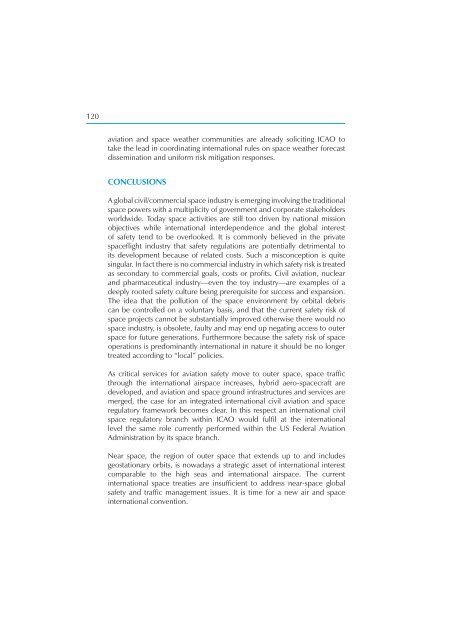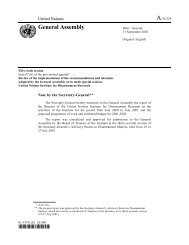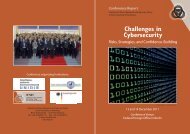Security in Space The Next Generation - UNIDIR
Security in Space The Next Generation - UNIDIR
Security in Space The Next Generation - UNIDIR
Create successful ePaper yourself
Turn your PDF publications into a flip-book with our unique Google optimized e-Paper software.
120<br />
aviation and space weather communities are already solicit<strong>in</strong>g ICAO to<br />
take the lead <strong>in</strong> coord<strong>in</strong>at<strong>in</strong>g <strong>in</strong>ternational rules on space weather forecast<br />
dissem<strong>in</strong>ation and uniform risk mitigation responses.<br />
CONCLUSIONS<br />
A global civil/commercial space <strong>in</strong>dustry is emerg<strong>in</strong>g <strong>in</strong>volv<strong>in</strong>g the traditional<br />
space powers with a multiplicity of government and corporate stakeholders<br />
worldwide. Today space activities are still too driven by national mission<br />
objectives while <strong>in</strong>ternational <strong>in</strong>terdependence and the global <strong>in</strong>terest<br />
of safety tend to be overlooked. It is commonly believed <strong>in</strong> the private<br />
spacefl ight <strong>in</strong>dustry that safety regulations are potentially detrimental to<br />
its development because of related costs. Such a misconception is quite<br />
s<strong>in</strong>gular. In fact there is no commercial <strong>in</strong>dustry <strong>in</strong> which safety risk is treated<br />
as secondary to commercial goals, costs or profi ts. Civil aviation, nuclear<br />
and pharmaceutical <strong>in</strong>dustry—even the toy <strong>in</strong>dustry—are examples of a<br />
deeply rooted safety culture be<strong>in</strong>g prerequisite for success and expansion.<br />
<strong>The</strong> idea that the pollution of the space environment by orbital debris<br />
can be controlled on a voluntary basis, and that the current safety risk of<br />
space projects cannot be substantially improved otherwise there would no<br />
space <strong>in</strong>dustry, is obsolete, faulty and may end up negat<strong>in</strong>g access to outer<br />
space for future generations. Furthermore because the safety risk of space<br />
operations is predom<strong>in</strong>antly <strong>in</strong>ternational <strong>in</strong> nature it should be no longer<br />
treated accord<strong>in</strong>g to “local” policies.<br />
As critical services for aviation safety move to outer space, space traffi c<br />
through the <strong>in</strong>ternational airspace <strong>in</strong>creases, hybrid aero-spacecraft are<br />
developed, and aviation and space ground <strong>in</strong>frastructures and services are<br />
merged, the case for an <strong>in</strong>tegrated <strong>in</strong>ternational civil aviation and space<br />
regulatory framework becomes clear. In this respect an <strong>in</strong>ternational civil<br />
space regulatory branch with<strong>in</strong> ICAO would fulfi l at the <strong>in</strong>ternational<br />
level the same role currently performed with<strong>in</strong> the US Federal Aviation<br />
Adm<strong>in</strong>istration by its space branch.<br />
Near space, the region of outer space that extends up to and <strong>in</strong>cludes<br />
geostationary orbits, is nowadays a strategic asset of <strong>in</strong>ternational <strong>in</strong>terest<br />
comparable to the high seas and <strong>in</strong>ternational airspace. <strong>The</strong> current<br />
<strong>in</strong>ternational space treaties are <strong>in</strong>suffi cient to address near-space global<br />
safety and traffi c management issues. It is time for a new air and space<br />
<strong>in</strong>ternational convention.








